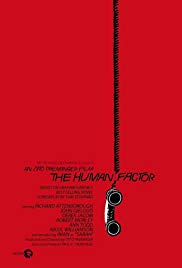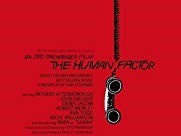The Human Factor ** (1979, Richard Attenborough, Nicol Williamson, Derek Jacobi, John Gielgud) – Classic Movie Review 8602
Otto Preminger’s 1979 spy film The Human Factor adapts the Graham Greene novel about an apparently innocent man, Maurice Castle (Nicol Williamson), suspected of being an MI6 mole.
Producer-director Otto Preminger’s feeble, uninspired 1979 British neo noir film version of the Graham Greene late classic novel The Human Factor tells a story of alleged treason and paranoiac suspicion about an apparently innocent man, Maurice Castle (Nicol Williamson), who is suspected of being a MI6 mole when there is an information leak from the African Section of British Intelligence.
Maurice Castle is a mid-level bureaucrat in MI6 who has an African wife, Sarah (Iman) and son Sam (Gary Forbes). Castle was thrown out of Apartheid South Africa, and Sarah was smuggled out of the country with the help of Matthew Connolly (Tony Vogel), whose Communist network Castle was assigned to spy on.
Doctor Percival (Robert Morley), an expert in assassinations and biological toxins, and éminence grise Sir John Hargreaves (Richard Vernon), advise newly appointed security chief Colonel John Daintry (Richard Attenborough) that they believe they have a leak in Castle’s department. Suspicion falls on Arthur Davis (Derek Jacobi), Castle’s red brick–educated playboy office partner.
Tom Stoppard’s screenplay just does not get to grips with the fascinating 1978 source material, although Richard Attenborough manages some remarkable acting as British Colonel John Daintry, the security man brought in to investigate, and Williamson is very acceptable, and there is a pleasing cast of British regulars of the day.
A past-his-prime Preminger does not seem at home among the British spies, and how could he have allowed that obvious studio set of the Kremlin?
With its too-literary, word-bound screenplay by Stoppard, The Human Factor just never sparks up, let alone delivers any spy thrills.
Also in the cast are Derek Jacobi, Robert Morley, John Gielgud, Ann Todd, Richard Vernon, Joop Doderer, Iman, Keith Marsh, Anthony Woodruff, Gary Forbes, Angela Thorne, Tony Haygarth, Paul Curran, Cyd Hayman, Ken Jones, Paul Seed, Chantal Gray, Fiona Fullerton, Leon Greene, Martin Benson, Marianne Stone, Adrienne Corri, Robert Dorning, and Frank Williams.
The story is based on the defection of Kim Philby, a friend of Graham Greene’s, to the Soviets.
The film is shot in Kenya and at Shepperton and Pinewood Studios, near London, as well as on location at Berkhamsted.
Preminger had trouble securing finance and had to fund it partly himself. It fared poorly. Costing $5,500,000, it took $376,050 at the box office. It proved Preminger’s last film. It was released by Rank Film Distributors in the UK and United Artists in the US and Canada, MGM’s first acquisition in six years there.
There’s a story that Preminger wanted to cast novelist Jeffrey Archer, much shorter than Iman, in the star role, but he failed his audition, though because of his size or acting ability is unrecorded.
The cast are Nicol Williamson as Maurice Castle, Richard Attenborough as Colonel John Daintry, John Gielgud as Brigadier Tomlinson, Derek Jacobi as Arthur Davis, Robert Morley as Doctor Percival, Ann Todd as Castle’s Mother, Iman as Sarah Castle, Joop Doderer as Cornelius Muller, Richard Vernon as Sir John Hargreaves, Angela Thorne as Lady Hargreaves, Fiona Fullerton as Elizabeth, Tony Haygarth as Buffy, Tony Vogel as Matthew Connolly, Martin Benson as Boris, Marianne Stone as Matron, Tom Chatto as General Phipps, Adrienne Corri as Sylvia, Sylvia Coleridge as Mrs Halliday, and Frank Williams as Bellamy
© Derek Winnert 2019 Classic Movie Review 8602
Check out more reviews on http://derekwinnert.com



